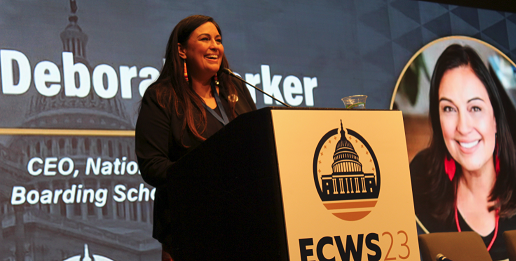
- Details
- By Levi Rickert
WASHINGTON — Speaking at the National Congress of American Indians (NCAI) Executive Council Winter Session on Wednesday, Deborah Parker (Tulalip), CEO of the National Native American Boarding School Healing Coalition (NABS), called on tribal leaders to advocate for the reintroduction of the Truth and Healing Commission on Indian Boarding School Policies Act.
In the previous Congressional session, the bill garnered 26 co-sponsors in the Senate and 86 co-sponsors in the House of Representatives. Additionally, the bill received widespread support from various Tribal Nations, Tribal regional organizations, the International Indian Treaty Council, and national Native organizations, including the National Congress of American Indians (NCAI).
“The opportunity we have all been waiting for is here,” Parker said. “If we’re going to get this done, the time is now. We owe it to ourselves, our Tribal Nations, boarding school survivors, and especially our future generations. We must vow to do better.”
NABS is advocating for the bill to be reintroduced into the 118th Congress.
The bi-partisan bill would establish a federal commission to:
- Conduct a full inquiry into the assimilative policies of U.S. Indian boarding schools.
- Collect testimony from boarding school survivors, Tribes, and subject matter experts.
- Create a findings and recommendations report, identifying legislative and administrative actions to address the impacts of U.S. Indian boarding schools.
- Investigate beyond DOI’s Federal Indian Boarding School Initiative and review records from churches and educational institutions that operated Indian boarding schools.
On Tuesday, during her State of Indian Nations Address, NCAI President Fawn Sharp (Quinault) said, “As our investigations continue to uncover the atrocities perpetrated in boarding schools in North America, we need to prepare ourselves mentally, physically, and spiritually to confront the full pain of that history. We must seek out the facts, and own them, so that we can eventually clear the path to an era of truth, healing, and empowerment.”
More Stories Like This
Navajo Resources and Development Committee Issues Notice on Livestock Inspection RequirementsAmerican Prairie, Tribal Coalition Files Protest Over Rescinded Grazing Rights
Northern Cheyenne Push Back Against Trump Administration’s Effort to Alter Little Bighorn History
Florida Man Sentenced for Falsely Selling Imported Jewelry as Pueblo Indian–Made
Navajo Nation Declares State Of Emergency As Winter Storm Threatens Region
Help us defend tribal sovereignty.
At Native News Online, our mission is rooted in telling the stories that strengthen sovereignty and uplift Indigenous voices — not just at year’s end, but every single day.
Because of your generosity last year, we were able to keep our reporters on the ground in tribal communities, at national gatherings and in the halls of Congress — covering the issues that matter most to Indian Country: sovereignty, culture, education, health and economic opportunity.
That support sustained us through a tough year in 2025. Now, as we look to the year ahead, we need your help right now to ensure warrior journalism remains strong — reporting that defends tribal sovereignty, amplifies Native truth, and holds power accountable.
 The stakes couldn't be higher. Your support keeps Native voices heard, Native stories told and Native sovereignty defended.
The stakes couldn't be higher. Your support keeps Native voices heard, Native stories told and Native sovereignty defended.
Stand with Warrior Journalism today.
Levi Rickert (Potawatomi), Editor & Publisher

